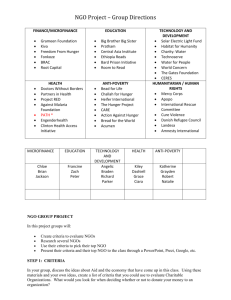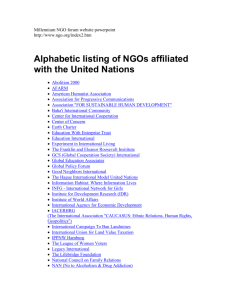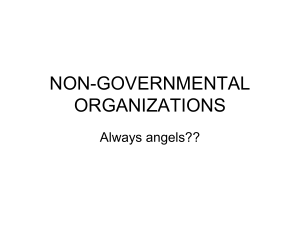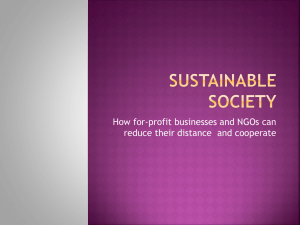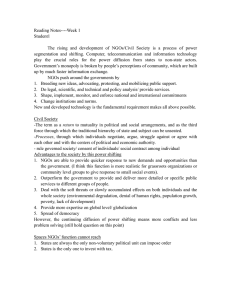Emily Greenspan April 5 Reaction Paper for Emily
advertisement
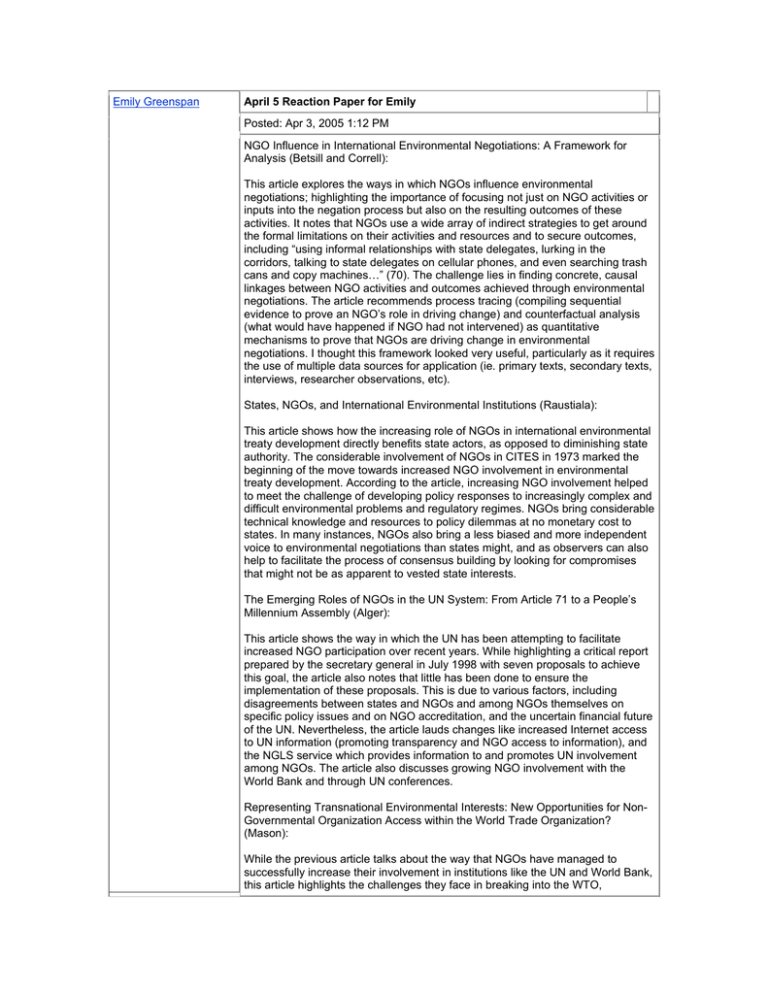
Emily Greenspan April 5 Reaction Paper for Emily Posted: Apr 3, 2005 1:12 PM NGO Influence in International Environmental Negotiations: A Framework for Analysis (Betsill and Correll): This article explores the ways in which NGOs influence environmental negotiations; highlighting the importance of focusing not just on NGO activities or inputs into the negation process but also on the resulting outcomes of these activities. It notes that NGOs use a wide array of indirect strategies to get around the formal limitations on their activities and resources and to secure outcomes, including “using informal relationships with state delegates, lurking in the corridors, talking to state delegates on cellular phones, and even searching trash cans and copy machines…” (70). The challenge lies in finding concrete, causal linkages between NGO activities and outcomes achieved through environmental negotiations. The article recommends process tracing (compiling sequential evidence to prove an NGO’s role in driving change) and counterfactual analysis (what would have happened if NGO had not intervened) as quantitative mechanisms to prove that NGOs are driving change in environmental negotiations. I thought this framework looked very useful, particularly as it requires the use of multiple data sources for application (ie. primary texts, secondary texts, interviews, researcher observations, etc). States, NGOs, and International Environmental Institutions (Raustiala): This article shows how the increasing role of NGOs in international environmental treaty development directly benefits state actors, as opposed to diminishing state authority. The considerable involvement of NGOs in CITES in 1973 marked the beginning of the move towards increased NGO involvement in environmental treaty development. According to the article, increasing NGO involvement helped to meet the challenge of developing policy responses to increasingly complex and difficult environmental problems and regulatory regimes. NGOs bring considerable technical knowledge and resources to policy dilemmas at no monetary cost to states. In many instances, NGOs also bring a less biased and more independent voice to environmental negotiations than states might, and as observers can also help to facilitate the process of consensus building by looking for compromises that might not be as apparent to vested state interests. The Emerging Roles of NGOs in the UN System: From Article 71 to a People’s Millennium Assembly (Alger): This article shows the way in which the UN has been attempting to facilitate increased NGO participation over recent years. While highlighting a critical report prepared by the secretary general in July 1998 with seven proposals to achieve this goal, the article also notes that little has been done to ensure the implementation of these proposals. This is due to various factors, including disagreements between states and NGOs and among NGOs themselves on specific policy issues and on NGO accreditation, and the uncertain financial future of the UN. Nevertheless, the article lauds changes like increased Internet access to UN information (promoting transparency and NGO access to information), and the NGLS service which provides information to and promotes UN involvement among NGOs. The article also discusses growing NGO involvement with the World Bank and through UN conferences. Representing Transnational Environmental Interests: New Opportunities for NonGovernmental Organization Access within the World Trade Organization? (Mason): While the previous article talks about the way that NGOs have managed to successfully increase their involvement in institutions like the UN and World Bank, this article highlights the challenges they face in breaking into the WTO, particularly in the context of environmental issues, which are often at odds with member country’s trade objectives. While some headway has made in terms of increasing NGO input (reduced wait period for the release of restricted documents, symposia oriented to non-state actors, briefings for NGO representatives, and allowing NGOs to observe in ministerial conferences), NGO involvement remains restricted in several ways. For example, while NGOs can observe ministerial conferences they cannot act as negotiators; and in a survey several NGOs noted their lack of access to key WTO representatives (though the article does note the importance of informal contact with WTO officials). Another key point is the notion that NGOs bring transnational ecological impacts into the trade discussion, which might not be addressed in discussions solely among state actors. Finally, an important point noted near the end of the article is the growing trend towards building relationships between southern states and ENGOs in order to increase the leverage of each in negotiations – which will likely lead to an increased focus on sustainable development issues.


